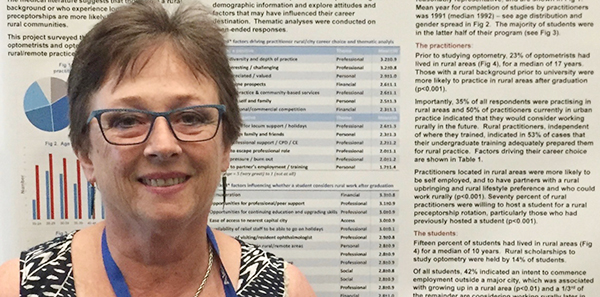1:30min

Professor Barbara Junghans and her poster at the American Academy of Optometry conference last week Photo: Associate Professor Craig Woods, Deakin University
______________________________
By Helen Carter
Journalist
More Australian and New Zealand optometrists are practising in the bush or indicating they would consider a rural move, new research shows.
The study by four optometry schools was presented as a poster at the American Academy of Optometry annual conference in Anaheim, California, on 9-12 November. The poster concluded: ‘The tide may be turning for the better regarding participation in the delivery of eye care in rural areas.’
Researchers approached 5,000 optometrists and students from four optometry schools in Australia and NZ. Responses received from 546 optometrists and 334 students revealed that 23 per cent of optometrists had lived in a rural area before studying optometry.
The project surveyed the attitudes and perceptions of optometrists and optometry students about rural/remote practice. Students, mainly in the latter half of the program, were from optometry schools at UNSW, the University of Melbourne, Queensland University of Technology and the University of Auckland.
Importantly, 35 per cent of responding optometrists were currently practising in rural areas and half of practitioners currently in urban practice indicated that they would consider working rurally in the future.
Another significant finding was that 42 per cent of students indicated an intent to start employment outside a major city, and one-third of the remainder said they were considering working rurally later in their career, half of them within five years.
Lead author Professor Barbara Junghans from the UNSW School of Optometry and Vision Science told Australian Optometry: ‘This means that potentially the tide may be turning on the poor distribution of Australasian optometrists in rural and remote areas.’
Fifteen per cent of students surveyed had lived in rural areas for an average of 10 years before taking up their studies, and 14 per cent held rural scholarships to study optometry. Students living away from home during university years were more likely to choose rural practice.
The poster concluded: ‘Rural background prior to university training, and the rural upbringing/lifestyle preferences of one’s partner, were shown to have a strong influence on practice destination.’
Some of the findings from the same cohort have been previously reported in Australian Optometry. However, the findings from the original survey plus the second survey concerning placement of graduating students, two years after the first, were presented at the conference.
The data backs previous medical studies by finding that those with a rural background are more likely to practise in rural areas after graduation. Two years of follow-up data from the UNSW school revealed that 47 per cent of graduands took up rural positions.
‘So 42 per cent said they would consider rural practice but two years later, 47 per cent from UNSW did,’ Professor Junghans said.
Rural practitioners indicated in 53 per cent of cases that their undergraduate training adequately prepared them for rural practice.
Longer preceptorships needed
Exposing students to a rural preceptorship for a short period did not appear to be a positive influence on career choice as only rural preceptorships of longer duration influenced students from a non-rural background to consider a career in rural and remote areas.
Seventy per cent of practitioners in rural areas were willing to host a student for a rural preceptorship rotation, especially those who had previously done so.
‘For the future, increased enrolment of students from rural backgrounds may be one effective strategy to balance the distribution of optometrists,’ the researchers said. ‘Studies of medical students have shown that longer compulsory rural rotations allow students brought up in the city to better value the virtues of rural life. Schools of optometry should consider longer rural rotations for their students.’
Positive factors which drove practitioner career choice were that rural practice offered greater diversity and depth of practice, was more interesting or challenging, they felt appreciated and valued, there were better income prospects, they could offer practice and community-based services, the lifestyle for themselves and their family was better, and there was less professional or commercial competition.
They saw disadvantages of working in the bush, including reduced opportunities for holidays and locum support, isolation from family and friends, lack of professional support including CPD and CE, difficulties escaping their professional role, greater pressure and burn-out, and barriers to their partner’s employment or training.
The top factors considered by students when deciding whether to practise rurally after graduation were remuneration, opportunities for professional and peer support and continuing education and upgrading skills, ease of access to the nearest capital city, availability of relief staff to enable holidays, and ophthalmologist availability.
The project was funded by the Australian Learning and Teaching Council. Others conducting the research were QUT Head of Optometry and Vision Science, Associate Professor Peter Hendicott, Anthea Cochrane from the University of Melbourne, Anna Palagyi from UNSW and Associate Professor Robert Jacobs from the University of Auckland.
As reported in Australian Optometry, a recent study suggests more needs to be done to encourage practising in the bush.